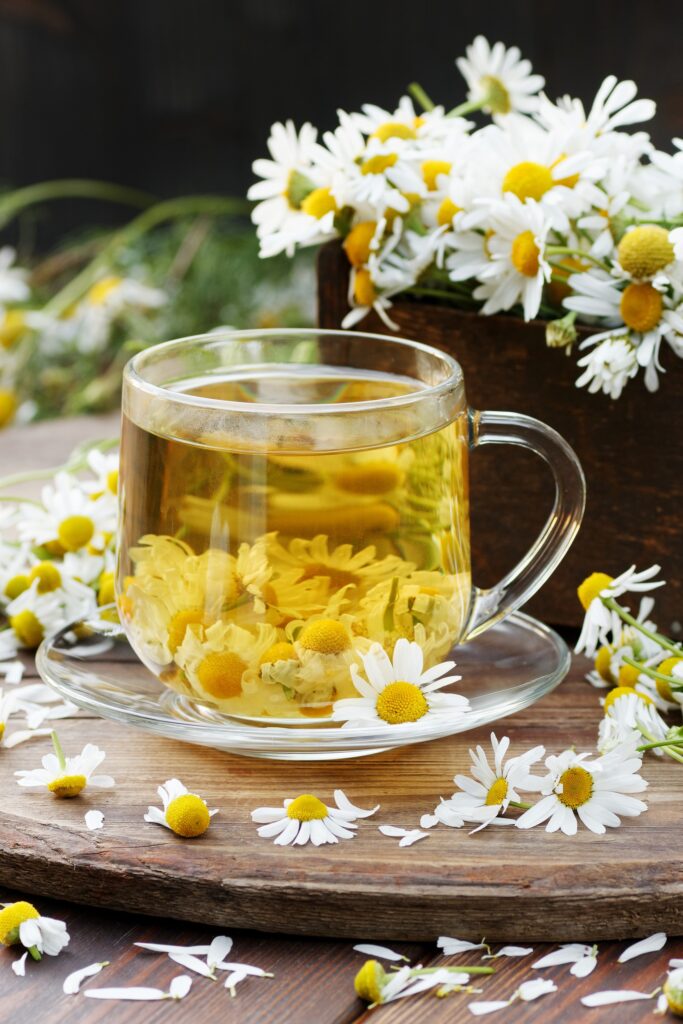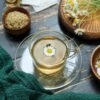
Chamomile tea, a fragrant and soothing herbal infusion, has been cherished for centuries for its remarkable therapeutic properties. Derived from the dried flowers of the chamomile plant, this gentle beverage has earned a well-deserved reputation as a natural remedy for a wide range of ailments. With its delicate aroma and subtly sweet taste, chamomile tea offers more than just a comforting sip; it is a potent elixir brimming with numerous health benefits.
From ancient civilizations to modern times, chamomile tea has been embraced for its versatility and efficacy. Its popularity spans cultures and continents, with many societies recognizing its ability to soothe the mind, body, and spirit. Whether consumed as a warm, calming drink or utilized in various herbal preparations, chamomile tea has proven itself to be a valuable ally in maintaining overall well-being.
As you delve into the world of chamomile tea, you’ll discover a treasure trove of potential benefits that have captivated the interest of researchers and health enthusiasts alike. From promoting relaxation and better sleep to aiding digestion and reducing inflammation, this humble herbal tea offers a natural and holistic approach to nurturing one’s health.
History and origins of chamomile tea
The history of chamomile tea is deeply rooted in ancient traditions and folklore. Originating from the daisy-like chamomile plant, which belongs to the Asteraceae family, this herbal infusion has been revered for its medicinal properties for thousands of years.
- Ancient Egyptian and Roman Civilizations:
- Chamomile was highly regarded in ancient Egyptian and Roman civilizations, where it was used for a variety of purposes, including treating fever, inflammation, and digestive issues.
- The ancient Egyptians even dedicated chamomile to their sun god, Ra, symbolizing its radiant and healing qualities.
- Medieval Europe:
- During the Middle Ages, chamomile tea gained widespread popularity in Europe, where it was cultivated in monastery gardens and used by monks for its calming and therapeutic effects.
- The herb was also utilized in traditional European folk medicine to treat a range of ailments, from insomnia and anxiety to skin conditions and menstrual cramps.
- Modern-Day Cultivation and Use:
- Today, chamomile is widely cultivated and consumed around the world, with Germany, Egypt, and Hungary being among the top producers.
- The popularity of chamomile tea has grown exponentially, driven by its accessibility, versatility, and the increasing demand for natural and holistic remedies.
Throughout its rich history, chamomile tea has transcended cultural boundaries, becoming a universal symbol of comfort and healing. Its enduring legacy continues to inspire modern-day research and appreciation for this time-honored herbal remedy.
Health benefits of chamomile tea
Chamomile tea is a true powerhouse of health benefits, thanks to its unique phytochemical composition. This gentle yet potent herbal infusion is brimming with a wide array of beneficial compounds, including flavonoids, terpenoids, and coumarins, which contribute to its remarkable therapeutic properties.
- Chamomile tea for relaxation and better sleep
- Chamomile tea for digestive health
- Chamomile tea for anxiety and stress relief
- Chamomile tea for skin health and inflammation
- Chamomile tea for menstrual cramps and PMS
- Chamomile tea vs. lavender chamomile tea: a comparison of benefits
Chamomile tea for relaxation and better sleep
One of the most well-known benefits of chamomile tea is its ability to promote relaxation and improve sleep quality. This calming effect can be attributed to the presence of apigenin, a flavonoid compound found in chamomile that binds to specific receptors in the brain, reducing anxiety and inducing a sense of tranquility.
Several studies have demonstrated the efficacy of chamomile tea in enhancing sleep quality and reducing the time it takes to fall asleep. By promoting relaxation and reducing stress levels, this soothing beverage can help alleviate insomnia and other sleep-related issues.
Additionally, chamomile tea has been shown to have a mild sedative effect, which can be particularly beneficial for those struggling with restlessness or anxiety at bedtime. Its gentle yet potent properties make it a natural and safe alternative to synthetic sleep aids, without the risk of dependency or adverse side effects.
Chamomile tea for digestive health
Chamomile tea has long been recognized for its ability to soothe digestive discomfort and promote overall gastrointestinal well-being. This herbal remedy contains compounds that exhibit anti-inflammatory and antispasmodic properties, which can help alleviate various digestive issues.
- Reducing Bloating and Gas:
- The anti-inflammatory properties of chamomile tea can help reduce bloating and gas by calming inflammation in the digestive tract.
- Its antispasmodic effects can also relax the smooth muscles in the intestines, alleviating cramping and discomfort.
- Soothing Indigestion and Heartburn:
- Chamomile tea has been found to be effective in reducing the symptoms of indigestion and heartburn.
- Its ability to neutralize stomach acid and relax the muscles in the esophagus can provide relief from the discomfort associated with these conditions.
- Promoting Healthy Bowel Movements:
- The gentle laxative effect of chamomile tea can help regulate bowel movements and alleviate constipation.
- Its anti-inflammatory properties may also help soothe irritation and discomfort associated with digestive disorders like inflammatory bowel disease (IBD).
By incorporating chamomile tea into your daily routine, you can support a healthy and well-functioning digestive system, promoting overall comfort and well-being.
Chamomile tea for anxiety and stress relief
In today’s fast-paced world, stress and anxiety have become increasingly prevalent, taking a toll on both physical and mental health. Fortunately, chamomile tea offers a natural and effective way to combat these issues, thanks to its calming and soothing properties.
- Reducing Anxiety Symptoms:
- Chamomile tea contains apigenin, a flavonoid compound that has been shown to bind to specific receptors in the brain, promoting a sense of calmness and reducing anxiety symptoms.
- Several studies have demonstrated the efficacy of chamomile tea in reducing anxiety levels and improving overall mood.
- Combating Stress and Promoting Relaxation:
- The soothing aroma and warm embrace of chamomile tea can help alleviate stress and promote a state of relaxation.
- Its gentle sedative effects can help calm the mind and body, making it an excellent choice for unwinding after a long and stressful day.
- Improving Sleep Quality:
- By reducing anxiety and promoting relaxation, chamomile tea can indirectly improve sleep quality.
- Its calming properties can help quiet the mind and prepare the body for a restful night’s sleep, alleviating insomnia and other sleep-related issues.
Incorporating chamomile tea into your daily routine can be a simple yet effective way to manage stress and anxiety levels, promoting overall mental well-being and a more balanced lifestyle.
Chamomile tea for skin health and inflammation
Chamomile tea is not only beneficial for internal health but also offers remarkable benefits for skin health and reducing inflammation. Its anti-inflammatory and antioxidant properties make it a valuable ally in combating various skin conditions and promoting a healthy, radiant complexion.
- Soothing Skin Irritations and Inflammation:
- The anti-inflammatory compounds present in chamomile tea can help soothe skin irritations, rashes, and inflammatory conditions like eczema and psoriasis.
- Its gentle and calming properties make it an excellent choice for sensitive skin types.
- Promoting Wound Healing:
- Chamomile tea has been traditionally used to accelerate wound healing and reduce scarring.
- Its antimicrobial and anti-inflammatory properties can help protect wounds from infection and promote faster healing.
- Combating Acne and Blemishes:
- The anti-inflammatory and antiseptic properties of chamomile tea make it an effective natural remedy for treating acne and blemishes.
- It can help reduce inflammation, unclog pores, and prevent bacterial growth, leading to clearer and healthier skin.
- Reducing Skin Aging:
- Chamomile tea is rich in antioxidants, which can help neutralize free radicals and protect the skin from oxidative stress, a major contributor to premature aging.
- Regular consumption or topical application of chamomile tea can help maintain skin elasticity and reduce the appearance of fine lines and wrinkles.
Whether consumed internally or used topically, chamomile tea offers a gentle and natural approach to promoting skin health, reducing inflammation, and achieving a radiant and youthful complexion.
Chamomile tea for menstrual cramps and PMS
For many women, the menstrual cycle can bring about a range of uncomfortable symptoms, including cramps, bloating, and mood swings. Fortunately, chamomile tea can provide much-needed relief and alleviate the discomfort associated with menstrual cramps and premenstrual syndrome (PMS).
- Alleviating Menstrual Cramps:
- Chamomile tea contains anti-inflammatory and antispasmodic compounds that can help relax uterine muscles and reduce the intensity of menstrual cramps.
- Its soothing properties can also help alleviate the associated discomfort and promote overall relaxation during this time.
- Reducing PMS Symptoms:
- The calming and mood-boosting effects of chamomile tea can help alleviate the emotional and psychological symptoms associated with PMS, such as irritability, mood swings, and anxiety.
- Its anti-inflammatory properties may also help reduce bloating and breast tenderness, which are common PMS complaints.
- Promoting Hormonal Balance:
- Some research suggests that chamomile tea may help regulate hormone levels, which can contribute to the alleviation of PMS symptoms and menstrual discomfort.
- Its gentle and natural properties make it a safe and effective option for managing hormonal imbalances.
By incorporating chamomile tea into your routine during menstrual cycles, you can experience relief from cramps, bloating, and other discomforts, while also promoting a more balanced and comfortable menstrual experience.
Chamomile tea vs. lavender chamomile tea: a comparison of benefits
While chamomile tea on its own offers a wealth of health benefits, combining it with lavender can create a synergistic effect, amplifying its therapeutic properties. Lavender chamomile tea, a blend of these two powerful herbs, has gained popularity for its unique and complementary benefits.
- Relaxation and Sleep:
- Both chamomile and lavender are renowned for their calming and sedative effects, making their combination an excellent choice for promoting relaxation and improving sleep quality.
- The synergistic effects of these herbs can help quiet the mind, reduce anxiety, and facilitate a restful night’s sleep.
- Stress and Anxiety Relief:
- The combination of chamomile and lavender has been shown to be particularly effective in reducing stress and anxiety levels.
- The soothing aroma and natural calming properties of these herbs can help alleviate tension, promote a sense of tranquility, and improve overall mood.
- Pain Relief:
- Lavender chamomile tea may offer enhanced pain-relieving properties due to the anti-inflammatory and analgesic effects of both herbs.
- This blend can be beneficial for individuals suffering from conditions like menstrual cramps, headaches, or muscle aches.
- Skin Health:
- Both chamomile and lavender possess anti-inflammatory and antioxidant properties, making their combination a powerful ally for promoting skin health and reducing inflammation.
- This blend can be used topically or consumed to support a radiant and healthy complexion.
While both chamomile and lavender chamomile teas offer unique benefits, the combination of these two herbs can provide a synergistic effect, amplifying their therapeutic properties and offering a more comprehensive approach to overall well-being.
How to prepare and brew chamomile tea
Preparing and brewing chamomile tea is a simple and straightforward process that can be easily incorporated into your daily routine. Whether you prefer loose chamomile flowers or convenient tea bags, the following steps will ensure a perfectly brewed cup of this soothing herbal infusion.
- Ingredients:
- Chamomile flowers (loose or in tea bags)
- Fresh, filtered water
- Brewing Instructions:
- For loose chamomile flowers:
- Place 1-2 teaspoons of dried chamomile flowers in a tea infuser or directly into a teapot or mug.
- Heat fresh, filtered water to a temperature between 195°F and 205°F (90°C and 96°C).
- Pour the hot water over the chamomile flowers, ensuring they are fully submerged.
- Allow the tea to steep for 5-7 minutes to extract the full flavor and beneficial compounds.
- For chamomile tea bags:
- Place one tea bag in a mug or teapot.
- Heat fresh, filtered water to a temperature between 195°F and 205°F (90°C and 96°C).
- Pour the hot water over the tea bag and let it steep for 3-5 minutes.
- For loose chamomile flowers:
- Customizing Your Cup:
- Honey: For a touch of sweetness, consider adding a teaspoon of honey to your chamomile tea. The natural sweetness complements the floral notes beautifully.
- Lemon: A squeeze of fresh lemon juice can add a refreshing citrus twist to your chamomile tea, enhancing its flavor and providing an additional boost of vitamin C.
- Lavender: For an extra calming experience, consider adding a few dried lavender buds to your chamomile tea. The combination of these two herbs creates a synergistic effect, promoting relaxation and tranquility.
Remember, chamomile tea is best enjoyed fresh and hot, allowing you to fully appreciate its delicate aroma and flavor. Experiment with different brewing times and additions to find your perfect cup of chamomile bliss.
Precautions and potential side effects of chamomile tea
While chamomile tea is generally considered safe for most individuals, it’s essential to be aware of potential precautions and side effects, especially for certain groups or specific circumstances.
- Allergic Reactions:
- Individuals with known allergies to plants from the Asteraceae family, which includes chamomile, should exercise caution when consuming chamomile tea.
- Allergic reactions can range from mild symptoms like skin rashes or itching to more severe reactions like difficulty breathing or anaphylaxis.
- Interactions with Medications:
- Chamomile tea may interact with certain medications, such as blood thinners (anticoagulants), sedatives, and medications metabolized by the liver.
- It’s advisable to consult with a healthcare professional before consuming chamomile tea if you are taking any prescription medications.
- Pregnancy and Breastfeeding:
- While chamomile tea is generally considered safe during pregnancy and breastfeeding when consumed in moderate amounts, it’s best to consult with a healthcare provider before regular consumption.
- Some studies suggest that excessive intake of chamomile tea during pregnancy may increase the risk of preterm labor or miscarriage.
- Potential Side Effects:
- In some individuals, chamomile tea may cause mild side effects, such as nausea, vomiting, or diarrhea, especially when consumed in large quantities.
- Rare cases of severe allergic reactions, including anaphylaxis, have been reported, but these are typically associated with topical use or inhalation of chamomile.
It’s important to remember that chamomile tea, like any herbal remedy, should be consumed in moderation and with caution. If you experience any adverse reactions or have concerns, it’s recommended to consult with a healthcare professional for personalized advice.
Incorporating chamomile tea into your daily routine
Chamomile tea, with its rich history and impressive array of health benefits, is a versatile and valuable addition to any wellness routine. From promoting relaxation and better sleep to aiding digestion and reducing inflammation, this gentle herbal infusion offers a natural and holistic approach to nurturing your overall well-being.
By incorporating chamomile tea into your daily routine, you can harness the power of this ancient remedy and experience its soothing effects firsthand. Whether you choose to enjoy a warm cup as part of your morning ritual, or savor its calming properties before bedtime, chamomile tea can be a comforting and therapeutic companion throughout your day.
Remember, the benefits of chamomile tea extend beyond its delightful taste and aroma. Its anti-inflammatory, antioxidant, and calming properties make it a valuable ally in supporting various aspects of your health, from digestive well -being to skin health and menstrual comfort. By embracing the simplicity and power of this ancient herbal remedy, you can embark on a journey towards greater overall wellness, one soothing sip at a time.To experience the remarkable benefits of chamomile tea for yourself, we invite you to explore our premium selection of organic, ethically sourced chamomile tea blends. Treat yourself to the ultimate in relaxation and rejuvenation with our carefully curated offerings. Visit our online store today and discover the perfect chamomile tea to elevate your daily self-care ritual.
Regardless of your specific health goals or concerns, chamomile tea can be a valuable companion on your wellness journey. Its versatility and gentle nature make it accessible to individuals of all ages and backgrounds, offering a natural and time-honored approach to nurturing the mind, body, and spirit.
So, why not embrace the soothing embrace of chamomile tea today? Savor its delicate aroma, allow its warmth to envelop you, and let its therapeutic properties work their magic. With each mindful sip, you’ll be taking a step towards a more balanced, harmonious, and vibrant life.






